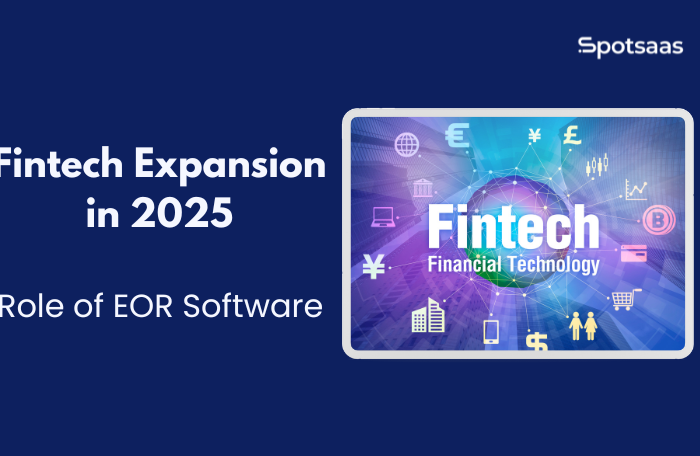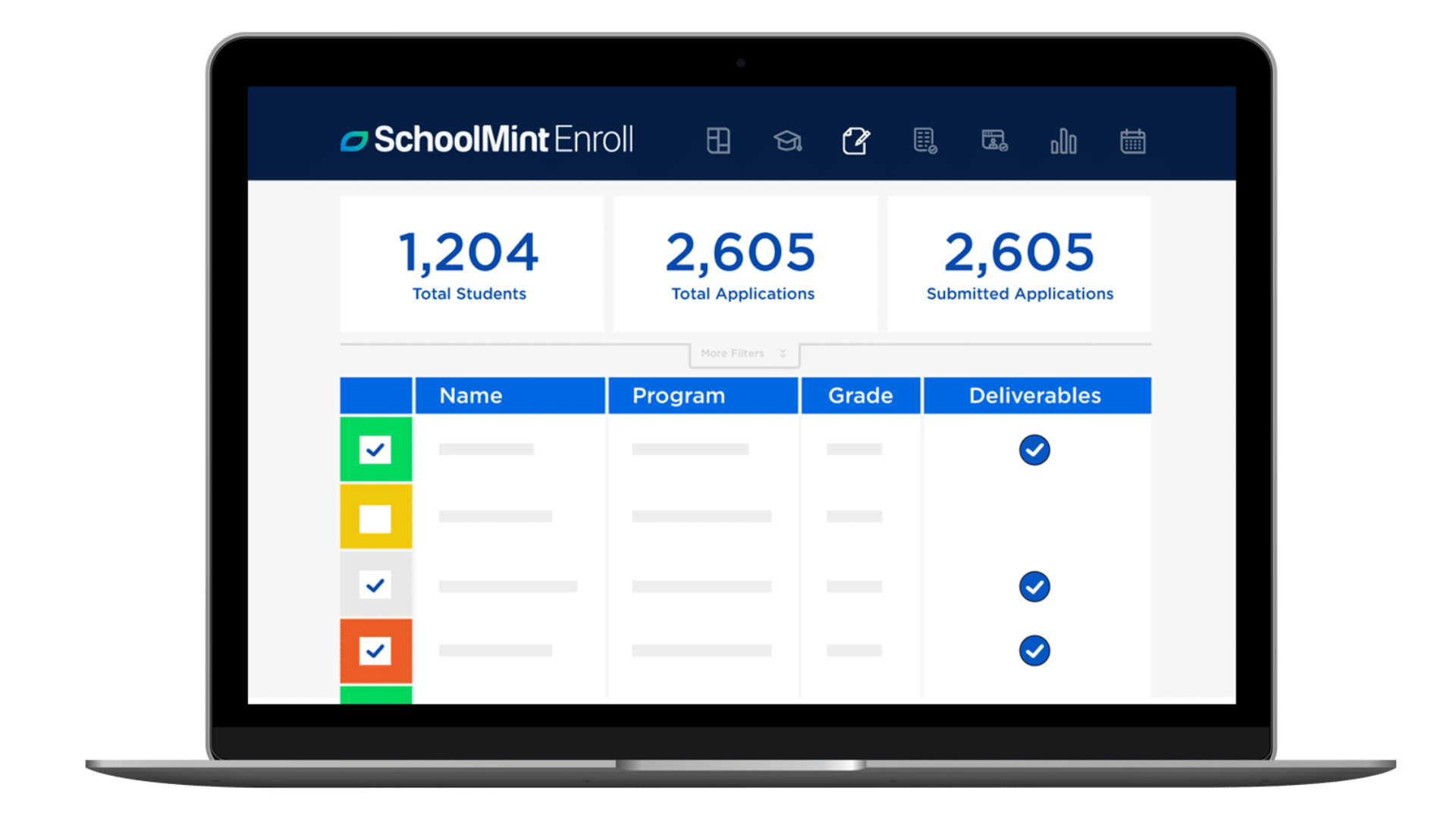For fintech companies aiming to grow beyond their home market, emerging regions present exciting opportunities — a rising user base, less-saturated markets, and a chance to innovate where digital finance is still catching up. But rapid expansion isn’t without hurdles.
Hiring in new countries often means dealing with unfamiliar regulations, setting up legal entities, managing local payroll, and staying compliant with labor laws — all of which can delay launch timelines and increase operational complexity.
This is where Employer of Record (EOR) software makes a real difference. Instead of navigating local rules and infrastructure on your own, EOR platforms act as the legal employer for your international team.
What This Blog Covers
This guide breaks down everything fintech companies need to know about using Employer of Record (EOR) software to expand in emerging markets. You’ll learn:
✅ What EOR software is and how it works
✅ Why it’s essential for fintechs to expand globally
✅ Key benefits of using EOR platforms in 2025
✅ Common challenges without EOR support
✅ Top features to look for in EOR software
✅ A comparison of the best EOR platforms for fintech
✅ Tips for choosing the right EOR provider
✅ Cost structure and pricing considerations
✅ Frequently asked questions for quick clarity
Whether you’re building your first remote team or scaling operations across borders, this guide will help you make an informed decision.
What Is Employer of Record (EOR) Software?
Employer of Record (EOR) software helps businesses hire talent in other countries without setting up a local entity. It acts as the legal employer on paper, while you maintain control over the employee’s day-to-day work and responsibilities.
Through an EOR platform, fintech companies can manage payroll, onboard employees, offer region-specific benefits, and stay aligned with local labor laws — all from a single dashboard. It removes the administrative burden of international hiring and gives companies a compliant way to scale quickly.
Think of it as a bridge between your business and new markets — a way to build remote teams legally and efficiently without having to worry about the complexity behind the scenes.
Why Fintech Companies Use EOR Software in Emerging Markets
Fintech companies thrive on speed, agility, and innovation — especially when entering high-growth regions like Southeast Asia, Latin America, or Africa. But while the opportunity is clear, so are the challenges: hiring talent, staying compliant, and launching operations in unfamiliar regulatory environments.
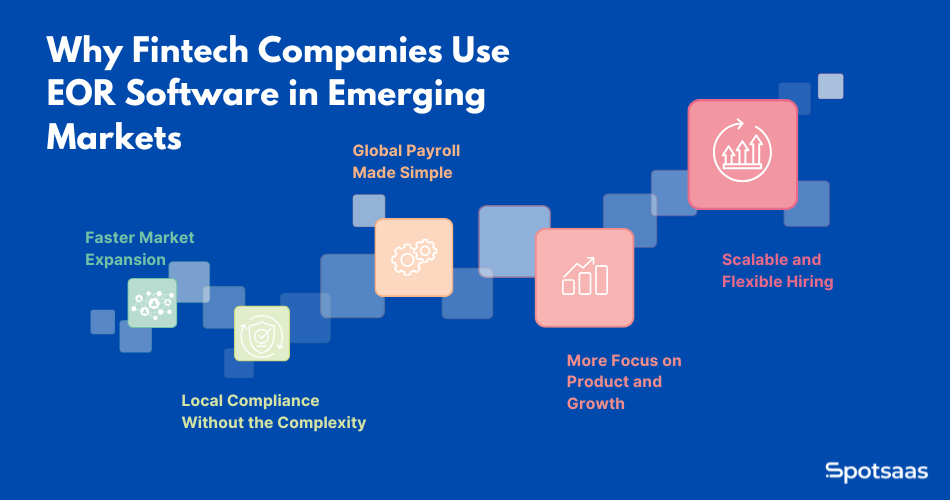
Here’s why more fintech leaders are turning to EOR platforms to drive global growth:
Faster Market Expansion
Setting up a legal entity in a new country is not only time-consuming — it’s also costly and complex. In many emerging markets, the process involves registering with multiple government agencies, hiring local legal experts, and maintaining ongoing compliance. For fintech firms that need to move quickly, this creates unnecessary delays.
EOR software allows you to bypass this setup altogether. You can hire employees in your target market through the EOR provider — often in a matter of days. This gives your company a head start in building local teams, testing products, and establishing brand presence without waiting for lengthy legal processes to complete.
Local Compliance Without the Complexity
Fintech is a highly regulated industry, and each country brings its own set of employment rules, tax regulations, and labor protections. Missteps in contracts, benefits, or termination practices can lead to penalties or brand damage.
EOR providers stay up to date with local employment laws and handle every aspect of compliance — from drafting compliant contracts to managing terminations in line with local regulations. This means your internal team doesn’t need to become experts in every jurisdiction you operate in.
Global Payroll Made Simple
Paying employees in different countries involves more than sending money abroad. You need to factor in currency conversions, local tax requirements, social contributions, and timing, not to mention the differences in payslip formats or reporting standards.
EOR platforms simplify this process by running a compliant, timely payroll in each region. They calculate local tax withholdings, handle filings with government authorities, and ensure employees are paid accurately and on time in their local currency.
More Focus on Product and Growth
Fintech teams often operate lean, with most resources dedicated to product, tech, and growth. Spending time managing legal paperwork, HR processes, or local employment rules can drain focus and slow down innovation.
By outsourcing those operational layers to an EOR provider, your internal team can stay focused on what they do best: building great financial products and scaling the business. EOR software becomes an extension of your HR and legal functions, reducing friction as you grow across borders.
Scalable and Flexible Hiring
In emerging markets, demand may shift quickly — you might start with one employee and grow to a full team within a few months. EOR software supports this kind of dynamic hiring without requiring a fixed structure or long-term commitments.
Whether you’re hiring contractors, full-time employees, or looking to test a new market with minimal risk, an EOR model offers the flexibility to scale up or down based on your business needs.
Challenges Fintech Companies Face Without EOR Software
Expanding into a new country without the right infrastructure in place can introduce unnecessary hurdles — especially for fintech firms that operate in highly regulated environments. Without EOR software, many companies face operational slowdowns, increased risk, and higher costs. Here are some of the most common challenges:
| Challenge | Description |
|---|---|
| Hiring Delays | Legal setup delays onboarding and slows market entry. |
| Compliance Risk | Hard to manage local labor law requirements alone. |
| Payroll Complexity | Multi-country payroll creates errors and delays. |
| Local Insight Gap | Missed hiring norms affect satisfaction and compliance. |
| Team Overload | Internal teams stretched handling global admin tasks. |
Delays in Hiring and Market Entry
Without an EOR partner, entering a new country means setting up a legal entity — a process that can stretch out for months. During this time, fintech companies lose ground while competitors move faster.
Recruiting, onboarding, and launching operations all get held back. For a product-driven business, speed is often the difference between leading and lagging.
Complex Compliance Requirements
Every country has its own labor regulations, from employment contracts to working hours and termination policies. Staying compliant without local legal support means researching everything from scratch.
This takes time and leaves room for error. One missed requirement — like a mandatory benefit — can create legal complications and slow down momentum.
Payroll and Tax Complexities
Managing EOR payroll across different regions isn’t just about paying employees — it involves local taxes, deductions, social security, and end-of-year filings. Without EOR software, fintech firms are left juggling spreadsheets, third-party consultants, and payment delays.
Mistakes in payroll or late tax submissions can result in penalties or unhappy employees.
Lack of Local Hiring Knowledge
Hiring practices vary widely — in some countries, employers are expected to offer healthcare solution coverage; in others, a probation period is mandatory. Without local insight, fintech companies may unintentionally skip critical steps or offer non-compliant packages.
This not only affects employee satisfaction but can trigger audits or legal reviews later on.
Operational Overload on Internal Teams
Your internal HR, legal, and finance teams are built for your home market — not global hiring. Expanding without EOR software means asking them to take on complex international admin tasks for which they may not be trained.
As a result, team efficiency drops, hiring slows down, and strategic goals get pushed back.
Key Features To Look For in EOR Software for Fintech
Finding the right Employer of Record software means choosing an EOR platform that simplifies international hiring while aligning with the pace and compliance standards expected in fintech. These five must-have features aren’t just checkboxes — they directly impact how efficiently and securely you scale into new markets.
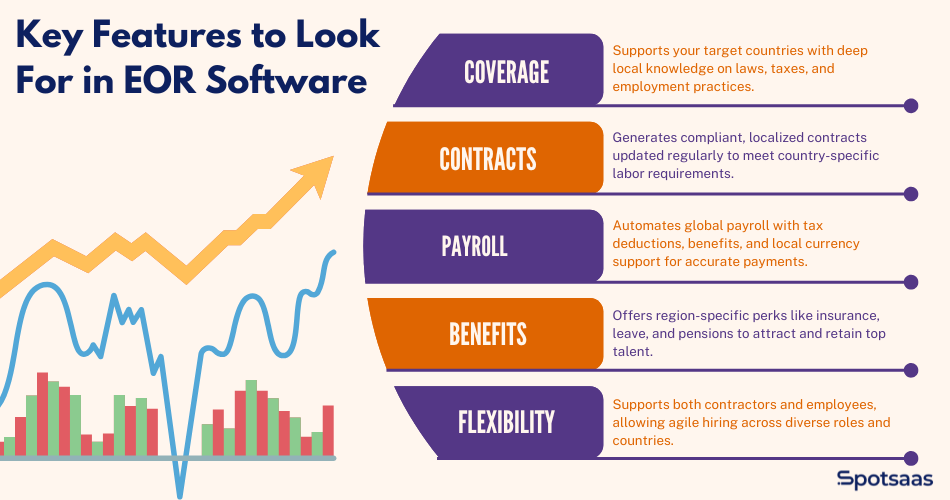
Global Coverage With Regional Expertise
An EOR platform should cover the countries you’re targeting — but that’s just the starting point. What matters more is how deeply the provider understands the local landscape. This includes labor laws, tax systems, benefits administration, and cultural expectations.
For fintech companies operating in regulated environments, this regional insight helps avoid compliance missteps and creates a smoother hiring experience for your international teams. A partner with in-country experts can also adapt faster when regulations shift.
Compliant, Country-Specific Employment Contracts
Hiring internationally means adhering to labor laws that vary by jurisdiction. The EOR should generate legally sound employment contracts that reflect the local structure — covering probation periods, notice terms, mandatory benefits, and more.
These contracts must be updated regularly to reflect policy changes in each country. For fintechs, where trust and structure matter, having confidence in your legal foundation ensures smoother audits, renewals, and employee satisfaction.
Automated Global Payroll With Tax Management
Managing payroll across different markets is one of the biggest administrative challenges in global hiring. The ideal EOR software should offer fully automated payroll runs — calculating deductions, filing local taxes, and handling contributions like pensions or social security.
It should support payments in local currencies and generate accurate payslips for each region. For fintech companies dealing with precision and financial integrity, a well-managed payroll system reduces risk and builds credibility with your global workforce.
Localized Benefits and Perks Administration
Employee benefits aren’t just a legal requirement — they’re a critical factor in attracting and retaining top talent. Your EOR partner should offer country-appropriate packages, including health insurance, leave entitlements, retirement plans, and more.
In some regions, benefits also include public transportation reimbursements or meal allowances. Having a provider that handles this locally helps your fintech team stay competitive while removing the need to negotiate with insurers or benefits administrators on your own.
Support for Both Contractors and Full-Time Employees
Global expansion rarely follows a single hiring model. You might hire developers full-time in one country while working with compliance officers or product testers as contractors elsewhere.
Your EOR software should support this flexibility, offering compliant frameworks for both engagement types. This allows your hiring strategy to stay agile without increasing legal complexity — a must-have for fintech firms building diverse international teams quickly and responsibly.
Top EOR Software for Fintech Companies
Deel
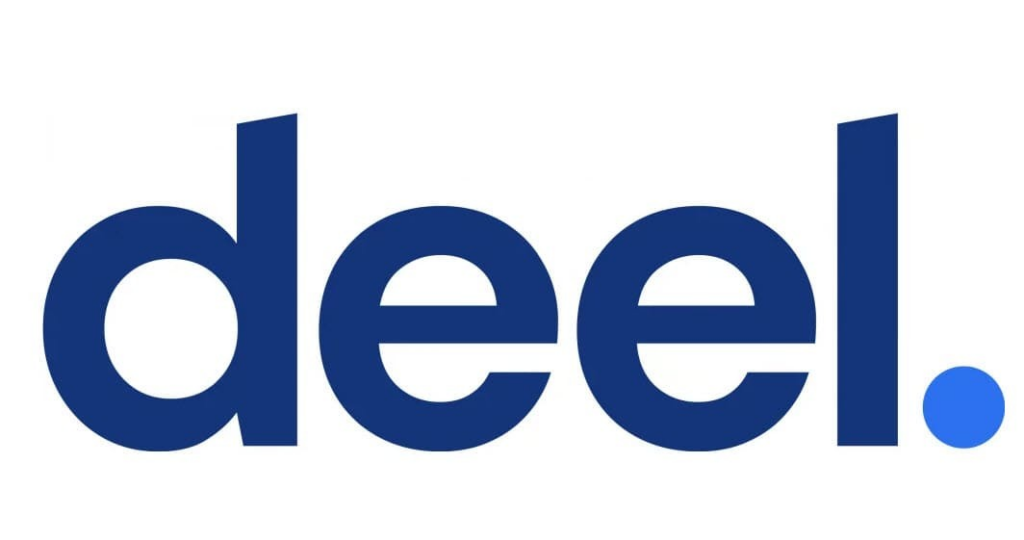
Overview of Deel
Deel is a leading Employer of Record (EOR) platform built to simplify global hiring for businesses of all sizes. With operations in over 150 countries, Deel enables companies to legally employ full-time workers without establishing local entities.
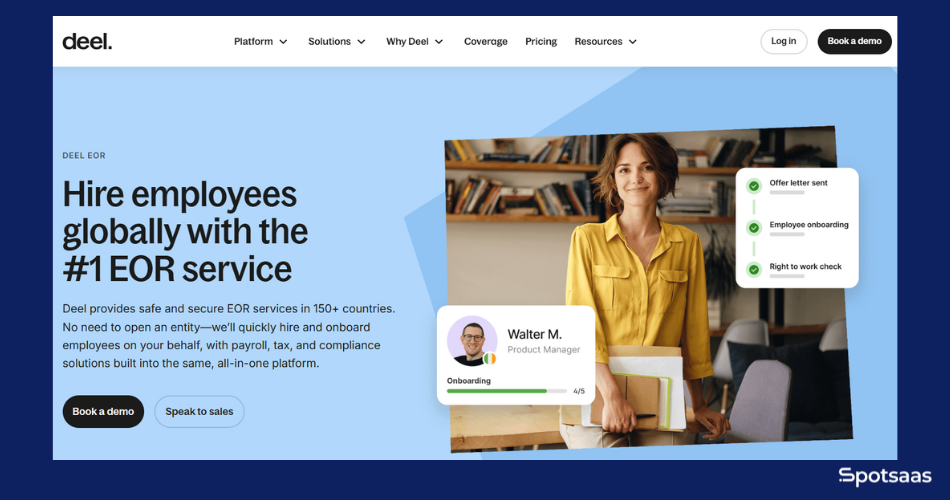
Deel software is for startups and enterprises to combine automation with legal infrastructure to help streamline international hiring, payroll, and compliance processes. It’s a strong solution for distributed teams, offering fast onboarding, localized contracts, and consistent payroll across borders.
Key Features of Deel
| Feature | Description |
|---|---|
| Employer of Record (EOR) | Hire full-time employees in 100+ countries. Deel handles contracts, tax, and compliance. |
| Global Payroll & Benefits | Run multi-country payroll and manage benefits like health insurance and pensions. |
| Automated Compliance | All contracts and filings align with local labor regulations and tax rules. |
| Onboarding & Document Management | Digitally onboard talent with localized contracts and secure document storage. |
| Employee Dashboard | Give employees access to payslips, benefits, and HR docs in one easy portal. |
Pricing
- Contractor Management: Starts at $49/month
- EOR (Full-Time Employees): Starts at $599/month per employee
- Global Payroll: From $29/month per employee
- US Payroll: From $19/month per employee
Why Choose It for Fintech?
Deel helps fintech startups scale across borders without the time or expense of establishing legal entities. Its automation tools reduce admin load and speed up hiring, while built-in compliance ensures peace of mind in regulated markets.
Rippling
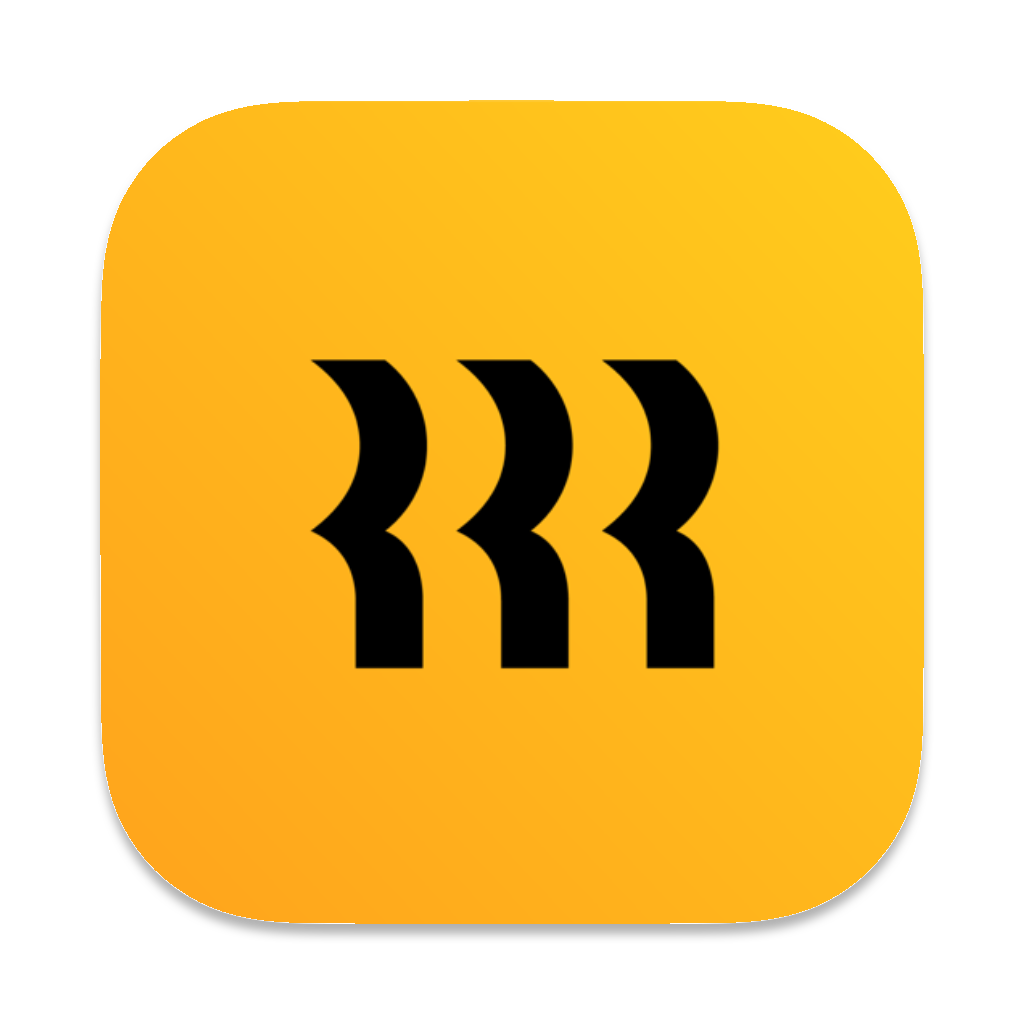
Overview of Rippling
Rippling offers an all-in-one HR, IT, and finance platform with a powerful global EOR feature. It’s designed for companies that want to manage employees, contractors, payroll, devices, and apps in one unified system.
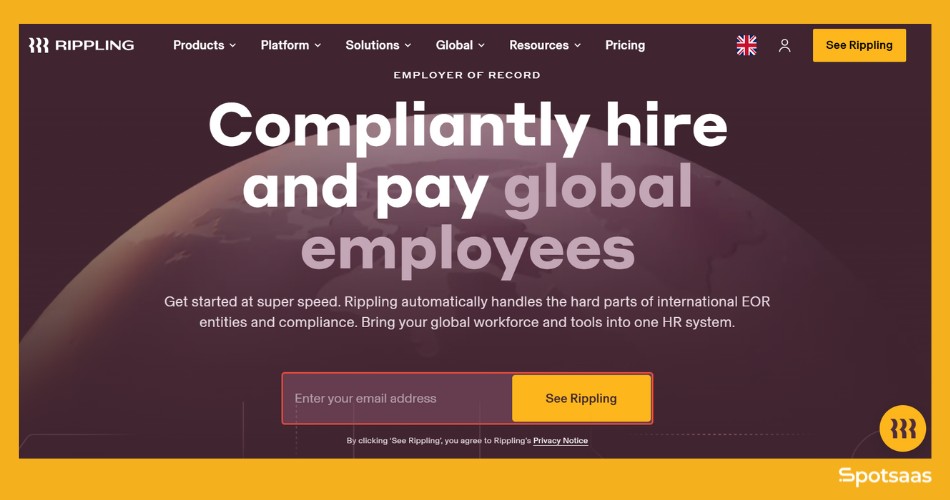
With its strong automation engine, Rippling handles onboarding, international payroll, and legal compliance across 50+ countries. For fintech teams looking to centralize operations while scaling internationally, Rippling offers unmatched flexibility.
Key Features of Rippling
| Feature | Description |
|---|---|
| Global Employer of Record | Hire and manage employees legally across 50+ countries without setting up entities. |
| Unified HR, IT & Finance Platform | Manage payroll, benefits, laptops, apps, and more from a single dashboard. |
| Custom Workflow Automation | Automate onboarding tasks like provisioning accounts, collecting documents, and setting up payroll. |
| Integrated Global Payroll | Run localized payroll across countries with tax deductions, filings, and multi-currency support. |
| Real-Time Reporting & Analytics | Track global headcount, costs, and compliance data in one place. |
Pricing
Rippling offers modular pricing based on selected services.
- Global EOR services typically start around $599/month per employee.
- Additional costs apply for payroll, benefits, and IT device management.
Why Choose It for Fintech?
Rippling is a great choice for fintech companies that want to manage HR and IT together. For companies with technical teams or remote workforces, Rippling’s device and app provisioning capabilities can save hours. Its automation tools also help small teams do more with less.
Oyster

Overview of Oyster
Oyster is a remote-first EOR platform built to help companies hire talent in 130+ countries. It’s designed for fast-moving startups that need a reliable infrastructure to onboard employees, run payroll, and stay compliant — all without setting up legal entities.

Oyster is known for its simplicity and transparent pricing. It also provides tools for managing equity, time off, and benefits — making it a strong fit for fintech companies building global teams.
Key Features of Oyster
| Feature | Description |
|---|---|
| Global Employment Infrastructure | Legally hire and pay employees in 130+ countries via Oyster’s EOR network. |
| Localized Payroll & Benefits | Run compliant payroll with access to country-specific benefits packages. |
| Equity & Time-Off Management | Track equity allocations, vacation days, and time-off policies globally. |
| Compliance Monitoring | Built-in tools ensure all hiring practices and contracts meet local standards. |
| Hiring Cost Estimator | Helps forecast employee costs in different countries before hiring. |
Pricing
- EOR Services: Starting from $599/month per employee
- Contractor Management: Lower-tier pricing available on request
- Hiring Cost Estimator Tool: Free to use for budgeting
Why Choose It for Fintech?
Oyster is ideal for remote-first fintech teams that want to stay nimble while expanding into new markets. Its intuitive platform, built-in compliance tools, and transparent pricing make it easy to manage international employees without legal bottlenecks.
Tips Before Choosing an EOR Partner
Selecting the right Employer of Record (EOR) partner is more than just comparing price points — it’s about ensuring long-term alignment with your business goals, tech company infrastructure, and compliance requirements. For fintech companies, the stakes are even higher, given the sensitive nature of financial data and the fast pace of scaling. Here are four practical tips to guide your selection process:
| Tips | Description |
|---|---|
| 🌍 Confirm Country Support | Ensure full legal and payroll support in the countries you want to hire. |
| 🔐 Review Data Standards | Check for GDPR, SOC 2, or ISO 27001 compliance to protect employee data. |
| 🎁 Check Benefits Offered | Look for region-specific benefits like insurance, pensions, and local perks. |
| 📈 Assess Scalability & Integrations | Ensure the platform grows with your team and connects to HR/finance tools. |
Confirm Country Support
Before committing, make a comparison checklist and double-check that the EOR provider has active support in the countries where you plan to hire. Some platforms may list global coverage but only offer full legal and payroll support in a limited set of locations.
It’s important to confirm operational presence, in-country compliance knowledge, and onboarding speed for your target regions.
Review Data Protection Standards
Fintech companies handle sensitive data daily — and your EOR platform will, too. Ensure the provider complies with international data privacy regulations such as GDPR, SOC 2, or ISO 27001.
Ask how employee data is stored, who has access, and what security protocols are in place to safeguard financial and personal information across countries.
Ask About Employee Benefit Offerings
An EOR should do more than just payroll — it should help you remain competitive as an employer. Review the benefits packages they offer in each country, such as health insurance, pensions, paid leave, and local perks.
These offerings directly impact employee satisfaction and retention, especially in emerging markets where benefits expectations can differ.
Check Platform Scalability and Integrations
As your company grows, your EOR should scale with you. Evaluate whether the platform supports larger team sizes, new country rollouts, or changes to employee types (e.g., contractor to full-time).
Also, check whether you can integrate EOR software with your existing HR, finance, or payroll systems. Smooth connectivity reduces manual work and helps keep your operations lean and efficient.
Conclusion
Expanding into emerging markets is a smart move for fintech companies, but it comes with legal, compliance, and operational hurdles. Employer of Record (EOR) software helps remove these barriers by handling local employment, payroll, and regulatory requirements. With the right EOR partner, fintech teams can hire faster, reduce administrative strain, and focus on core growth initiatives.
As you evaluate solutions, consider country coverage, data security, benefits support, and platform scalability. The right EOR platform isn’t just a service—it’s a strategic ally in your global expansion journey. Choose a solution that grows with your business and adapts to every market.
Frequently Asked Questions
What is EOR software?
EOR software helps companies legally hire and pay employees in other countries without opening local entities.
Is EOR software suitable for startups?
Yes, it’s ideal for startups looking to expand quickly without heavy legal or HR overhead.
How much does EOR software cost?
Pricing usually starts at $500–$700 per employee per month, depending on the provider and services.
Can I hire both contractors and full-time employees through an EOR?
Yes, most EOR platforms support both contractor payments and full-time employment.
Is using an EOR compliant with local laws?
Yes, EOR providers ensure all contracts, payroll, and benefits follow country-specific labor regulations.


